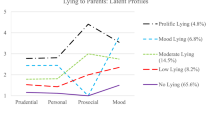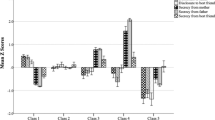Abstract
Lie-telling and secret-keeping are common behaviors during adolescence. Given the importance of honesty for building trust in positive relationships, the present study examined relations between lie-telling, secret-keeping, and relationship quality over time. Additionally, given the protective role of positive relationships in developing depression, the present study examined how lying to and keeping secrets from parents related to depressive symptoms over time. Children and adolescents (N = 1313; 8 to 15 years old at Time 1, Mage= 11.65, SD = 11.75; 50.04% male) reported on lying to parents, secret-keeping from parents, relationship quality with parents, and depressive symptoms at two time points one year apart. The results indicated that greater secret-keeping was bidirectionally associated with poorer parent-child relationship quality and greater depressive symptoms over time. Thus, keeping secrets from parents appears to be an important behavior to examine in the context of development between late childhood and adolescence.

Similar content being viewed by others
References
Aalto-Setälä, T., Marttunen, M., Tuulio-Henriksson, A., Poikolainen, K., & Lönnqvist, J. (2002). Depressive symptoms in adolescence as predictors of early adulthood depressive disorders and maladjustment. American Journal of Psychiatry, 159, 1235–1237. https://doi.org/10.1176/appi.ajp.159.7.1235.
Abramson, L. Y., Metalsky, G. I., & Alloy, L. B. (1989). Hopelessness depression: a theory-based subtype of depression. Psychological Review, 96, 358–372.
Armsden, G. C., & Greenberg, M. T. (1987). The inventory of parent and peer attachment: individual differences and their relationship to psychological well-being in adolescence. Journal of Youth and Adolescence, 16, 427–454. https://doi.org/10.1007/BF02202939.
Armsden, G. C., McCauley, E., Greenberg, M. T., Burke, P. M., & Mitchell, J. R. (1990). Parent and peer attachment in early adolescent depression. Journal of Abnormal Child Psychology, 18, 683–697. https://doi.org/10.1007/BF01342754.
Austin, J. L. (1962). How to do things with words. Cambridge, MA: Harvard University Press.
Bok, S. (1989). Secrets: On ethics of concealment and revelation. New York, NY: Vintage Books.
Collins, W. A., Laursen, B., Mortensen, N., Luebker, C., & Ferreira, M. (1997). Conflict processes and transitions in parent and peer relationships: implications for autonomy and regulation. Journal of Adolescent Research, 12, 178–198. https://doi.org/10.1177/0743554897122003.
Conley, T. D., Moors, A. C., Ziegler, A., & Feltner, M. R. (2011). Trust and satisfaction in adult child–mother (and other) relationships. Basic and Applied Social Psychology, 33, 239–254.
Darling, N., Cumsille, P., Caldwell, L. L., & Dowdy, B. (2006). Predictors of adolescents’ disclosure to parents and perceived parental knowledge: between- and within-person differences. Journal of Youth and Adolescence, 35, 659–670. https://doi.org/10.1007/s10964-006-9058-1.
Debey, E., De Schryver, M., Logan, G. D., Suchotzki, K., & Verschuere, B. (2015). From junior to senior Pinocchio: a cross-sectional lifespan investigation of deception. Acta Psychologica, 160, 58–68. https://doi.org/10.1016/j.actpsy.2015.06.007.
DePaulo, B. M., Lindsay, J. J., Malone, B. E., Muhlenbruck, L., Charlton, K., & Cooper, H. (2003). Cues to deception. Psychological Bulletin, 129, 74–118. https://doi.org/10.1037/0033-2909.129.1.74.
Engels, R. C. M. E., Finkenauer, C., & Van Kooten, D. C. (2006). Lying behavior, family functioning and adjustment in early adolescence. Journal of Youth and Adolescence, 35, 949–958. https://doi.org/10.1007/s10964-006-9082-1.
Evans, A. D., Bender, J., & Lee, K. (2016). Can parents detect 8- to 16-year-olds’ lies? Parental biases, confidence, and accuracy. Journal of Experimental Child Psychology, 147, 152–158. https://doi.org/10.1016/j.jecp.2016.02.011.
Evans, A. D., & Lee, K. (2014). The relation between 8- to 17-year-olds’ judgments of other’s honesty and their own past honest behaviors. International Journal of Behavioral Development, 38, 277–281. https://doi.org/10.1177/0165025413517580.
Finkenauer, C., Engels, R. C. M. E., & Meeus, W. (2002). Keeping secrets from parents: advantages and disadvantages of secrecy in adolescence. Journal of Youth and Adolescence, 31, 123–136. https://doi.org/10.1023/A:1014069926507.
Frijns, T., & Finkenauer, C. (2009). Longitudinal associations between keeping a secret and psychosocial adjustment in adolescence. International Journal of Behavioral Development, 33, 145–154. https://doi.org/10.1177/0165025408098020.
Frijns, T., Finkenauer, C., Vermulst, A. A., & Engels, R. C. M. E. (2005). Keeping secrets from parents: longitudinal associations of secrecy in adolescence. Journal of Youth and Adolescence, 34, 137–148. https://doi.org/10.1007/s10964-005-3212-z.
Garnefski, N., Legerstee, J., Kraaij, V., Van den Kommer, T., & Teerds, J. (2002). Cognitive coping strategies and symptoms of depression and anxiety: a comparison between adolescents and adults. Journal of Adolescence, 25, 603–611. https://doi.org/10.1006/jado.2002.0507.
Gingo, M., Roded, A. D., & Turiel, E. (2017). Authority, autonomy, and deception: evaluating the legitimacy of parental authority and adolescent deceit. Journal of Research on Adolescence, 27, 862–877. https://doi.org/10.1111/jora.12319.
Grice, H. P. (1980). Studies in the way of words. Cambridge, M.A: Harvard University Press.
Kashubeck, S., & Christensen, S. A. (1995). Parental alcohol use, family relationship quality, self-esteem, and depression in college students. Journal of College Student Development, 36(5), 431–443.
Kelly, A. E. (2002). The psychology of secrets. New York, NY: Plenum.
Kerr, M., & Stattin, H. (2000). What parents know, how they know it, and several forms of adolescent adjustment: further support for a reinterpretation of monitoring. Developmental Psychology, 36, 366–380. https://doi.org/10.1037/0012-1649.36.3.366.
La Greca, A. M., & Harrison, H. M. (2005). Adolescent peer relations, friendships, and romantic relationships: do they predict social anxiety and depression? Journal of Clinical Child and Adolescent Psychology, 34, 49–61. https://doi.org/10.1207/s15374424jccp3401_5.
Laird, R. D., & Marrero, M. D. (2010). Information management and behavior problems: is concealing misbehavior necessarily a sign of trouble? Journal of Adolescence, 33, 297–308. https://doi.org/10.1016/j.adolescence.2009.05.018.
Lavoie, J., Nagar, P. M., & Talwar, V. (2017). From Kantian to Machiavellian deceivers: development of children’s reasoning and self-reported use of secrets and lies. Childhood, 24, 197–211. https://doi.org/10.1177/0907568216671179.
Lee, A., Hankin, B. L., & Mermelstein, R. J. (2010). Perceived social compentence, negative social interactions, and negative cognitive stlye predict depressive symptoms during adolescence. Journal of Clinical child & Adolescent Psychology, 39, 603–615. https://doi.org/10.1080/15374416.2010.501284.
Levine, T. R., Serota, K. B., Carey, F., & Messer, D. (2013). Teenagers lie a lot: a further investigation into the prevalence of lying. Communication Research Reports, 30, 211–220. https://doi.org/10.1080/08824096.2013.806254.
Meijer, A. M., Reitz, E., & Dekovic, M. (2016). Parenting matters: a longitudinal study into parenting and adolescent sleep. Journal of Sleep Research, 25, 556–564. https://doi.org/10.1111/jsr.12406.
Oldfield, J., Humphrey, N., & Hebron, J. (2015). The role of parental and peer attachment relationships and school connectedness in predicting adolescent mental health outcomes. Child and Adolescent Mental Health, 21, 21–29. https://doi.org/10.1111/camh.12108.
Pennebaker, J. W. (1989). Confession, inhibition, and disease. Advances in Experimental Social Psychology, 22, 211–244. https://doi.org/10.1016/S0065-2601(08)60309-3.
Radloff, L. S. (1977). The CES-D Scale: a self-report depression scale for research in the general population. Applied Psychological Measurement, 1, 385–401. https://doi.org/10.1177/014662167700100306.
Rote, W. M., & Smetana, J. G. (2015). Beliefs about parents' right to know: domain differences and associations with change in concealment. Journal of Research on Adolescence, 26, 334–344. https://doi.org/10.1111/jora.12194.
Rotenberg, K. J. (1994). Loneliness and interpersonal trust. Journal of Social and Clinical Psychology, 13, 152–173. https://doi.org/10.1521/jscp.1994.13.2.152.
Saluja, G., Iachan, R., Scheidt, P. C., Overpeck, M. D., Sun, W., & Geidd, J. N. (2004). Prevalence of risk factors for depressive symptoms among young adolescents. Archives of Pediatrics and Adolescent Medicine, 158, 760–765. https://doi.org/10.1001/archpedi.158.8.760.
Schafer, J. L., & Graham, J. W. (2002). Missing data: our view of the state of the art. Psychological Methods, 7, 147–177. https://doi.org/10.1037/1082-989X.7.2.147.
Searle, J. (1969). Speech acts. Cambridge, U.K.: Cambridge University Press.
Smetana, J. G., Villalobos, M., Tasopoulos-Chan, M., Gettman, D. C., & Campione-Barr, N. (2009). Early and middle adolescents' disclosure to parents about activities in different domains. Journal of Adolescence, 32, 693–713. https://doi.org/10.1016/j.adolescence.2008.06.010.
Smetana, J. G., Villalobos, M., Rogge, R. D., & Tasopoulos-Chan, M. (2010). Keeping secrets from parents: daily variations among poor, urban adolescents. Journal of Adolescence, 33, 321–331. https://doi.org/10.1016/j.adolescence.2009.04.003.
Stattin, H., & Kerr, M. (2000). Parental monitoring: a reinterpretation. Child Development, 71, 1072–1085. https://doi.org/10.1111/1467-8624.00210.
Steinberg, L. (2006). Risk taking in adolescence: what changes, and why? Adolescent Brain Development: Vulnerabilities and Opportunities, 1021, 51–58. https://doi.org/10.1196/annals.1308.005.
Talwar, V., Renaud, S. J., & Conway, L. (2015). Detecting children’s lies: are parents accurate judges of their own children’s lies? Journal of Moral Education, 44, 81–96. https://doi.org/10.1080/03057240.2014.1002459.
Turiel, E. (2002). The culture of morality: Social development, context, and conflict. New York, NY, US: Cambridge University Press. https://doi.org/10.1017/CBO9780511613500.
Victor, S. E., Hipwell, A. E., Stepp, S. D., & Scott, L. N. (2019). Parent and peer relationships as longitudinal predictors of adolescent non-suicidal self-injury onset. Child and Adolescent Psychiatry and Mental Health, 13, 1–13. https://doi.org/10.1186/s13034-018-0261-0.
Warr, M. (2007). The tangled web: delinquency, deception, and parental attachment. Journal of Youth and Adolescence, 36, 607–622. https://doi.org/10.1007/s10964-006-9148-0.
Weissman, M. M., Orvaschel, H., & Padian, N. (1980). Children’s symptom and social functioning self-report sclaes: comparison of mothers’ and children’s reports. The Journal of Nervous and Mental Disease, 168, 736–740. https://doi.org/10.1097/00005053-198012000-00005.
Willoughby, T., Heffer, T., & Hamza, C. A. (2015). The link between nonsuicidal self-injury and acquired capability for suicide: a longitudinal study. Journal of Abnormal Psychology, 124, 1110–1115. https://doi.org/10.1037/abn0000104.
Wisdom, J. P., Clarke, G. N., & Green, C. A. (2006). What teens want: barriers to seeking care for depression. Administration and Policy in Mental Health and Mental Health Services Research, 33, 133–145. https://doi.org/10.1007/s10488-006-0036-4.
Acknowledgements
The authors would also like to thank the research assistants who assisted with data collection, as well as the parents and children for their participation in the study.
Authors’ Contributions
VWD conceived of the research question, performed the statistical analyses, and drafted the manuscript; TW conceived of the study design and coordination, aided in statistical analyses, and provided input on drafts of the manuscript; ADE aided in designing the study, forming the research question and helped to draft the manuscript. All authors read and approved the final manuscript.
Funding
TW acknowledges funding from the Canadian Institutes for Health Research and ADE acknowledges funding from the Social Sciences and Humanities Research Council of Canada.
Data Sharing and Declaration
This manuscript’s data will not be deposited.
Author information
Authors and Affiliations
Corresponding author
Ethics declarations
Conflict of Interest
The authors declare that they have no conflict of interest.
Ethical Approval
All procedures performed in studies involving human participants were in accordance with the ethical standards of the institutional and/or national research committee Brock University Research Ethics Board (reference number: 16-080) and with the 1964 Helsinki declaration and its later amendments or comparable ethical standards.
Informed Consent
Informed consent was obtained from all individuals prior to participating.
Additional information
Publisher’s note Springer Nature remains neutral with regard to jurisdictional claims in published maps and institutional affiliations.
Rights and permissions
About this article
Cite this article
Dykstra, V.W., Willoughby, T. & Evans, A.D. A Longitudinal Examination of the Relation Between Lie-Telling, Secrecy, Parent–Child Relationship Quality, and Depressive Symptoms in Late-Childhood and Adolescence. J Youth Adolescence 49, 438–448 (2020). https://doi.org/10.1007/s10964-019-01183-z
Received:
Accepted:
Published:
Issue Date:
DOI: https://doi.org/10.1007/s10964-019-01183-z




